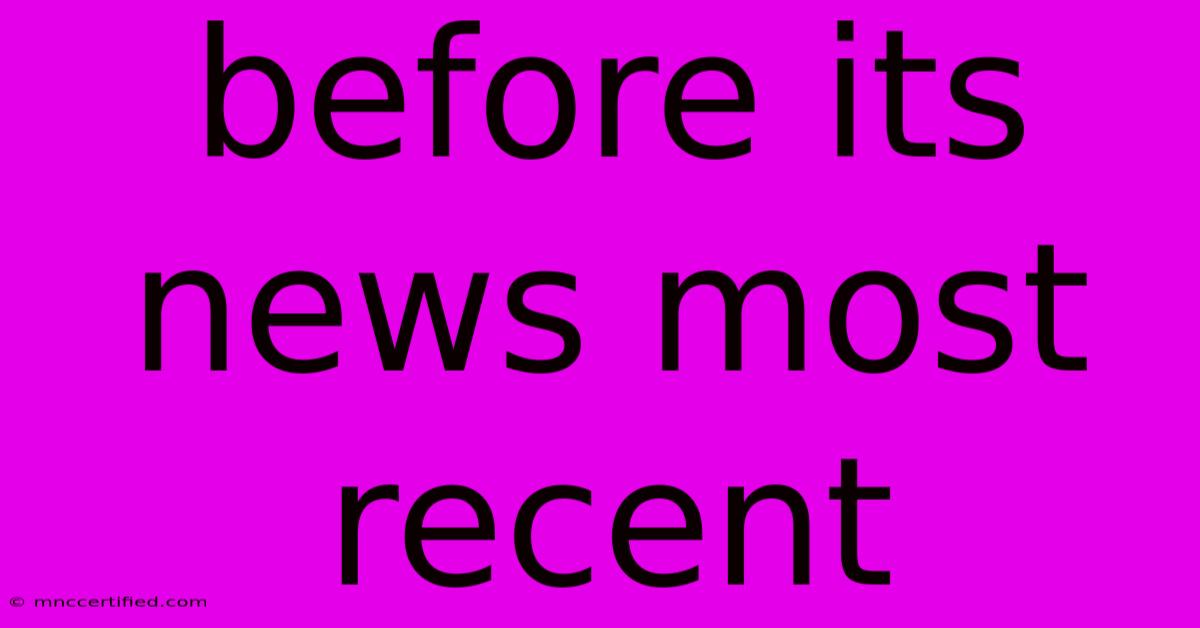Before Its News Most Recent

Table of Contents
Before It's News: A Deep Dive into the Controversial Online Platform
Before It's News (BIN) is a controversial online news aggregator and content platform known for its wide-ranging and often unverified content. While it offers a platform for independent voices and alternative perspectives, it's also heavily criticized for its publication of conspiracy theories, misinformation, and fake news. This article will explore BIN's history, its content, its impact, and the ongoing debate surrounding its role in the online information landscape.
A History of Before It's News
Launched in 2007, Before It's News initially positioned itself as a platform for citizen journalism and alternative news sources. The site allowed users to submit articles, creating a diverse, albeit largely unregulated, collection of information. This open-door policy, while fostering a sense of community and free speech, also opened the floodgates to a significant amount of unreliable and unsubstantiated content. The platform's lack of robust fact-checking mechanisms quickly became a major point of contention.
The Content Controversy: Conspiracy Theories and Misinformation
The most significant criticism leveled against Before It's News centers on its publication of conspiracy theories and misinformation. The platform has hosted articles promoting various unsubstantiated claims, ranging from 9/11 conspiracy theories to unfounded accusations against prominent figures. This has led to concerns about the site's contribution to the spread of false narratives and the potential for real-world consequences. The lack of editorial oversight and fact-checking makes it difficult to discern credible information from outright fabrications.
Examples of Controversial Content:
- Political Conspiracy Theories: BIN has been a breeding ground for numerous political conspiracy theories, often targeting specific individuals or groups.
- Health Misinformation: The platform has hosted articles promoting unproven medical treatments and spreading misinformation about various health issues.
- Fake News and Hoaxes: BIN has been implicated in the spread of numerous fake news stories and hoaxes, contributing to the broader problem of online disinformation.
The Impact of Before It's News
The impact of Before It's News on the spread of misinformation is a subject of ongoing debate. While the site's reach may not be as vast as major mainstream news outlets, its influence within specific communities and on particular topics is undeniable. The platform’s algorithms and user engagement features contribute to the spread of its content, potentially radicalizing users and reinforcing existing biases. This poses a significant challenge to media literacy and responsible online engagement.
The Ongoing Debate: Free Speech vs. Responsibility
The existence of Before It's News raises crucial questions about the balance between free speech and the responsibility of online platforms to combat misinformation. While proponents argue that the platform provides a space for dissenting voices and alternative perspectives, critics emphasize the dangers of unchecked dissemination of false information. The debate highlights the complexities of regulating online content and the need for greater media literacy among users.
Alternatives to Before It's News
If you're seeking reliable news and information, it's crucial to rely on trusted sources. Consider reputable news organizations with a proven track record of fact-checking and journalistic integrity. Always cross-reference information from multiple sources before forming conclusions. Developing strong critical thinking skills is paramount in navigating the complex online information landscape.
Conclusion: Navigating the Information Landscape
Before It's News remains a controversial platform, highlighting the ongoing challenge of regulating online information and combating the spread of misinformation. While the site allows for diverse voices, its lack of oversight and proliferation of unsubstantiated content raise serious concerns. Users should exercise extreme caution when accessing information from such platforms and prioritize credible, fact-checked sources for reliable news. The responsibility for discerning truth from falsehood lies ultimately with the individual consumer of information.

Thank you for visiting our website wich cover about Before Its News Most Recent. We hope the information provided has been useful to you. Feel free to contact us if you have any questions or need further assistance. See you next time and dont miss to bookmark.
Featured Posts
-
Elko On Owens Texas Game Decision
Dec 02, 2024
-
Pa Municipal Bonds For Sale
Dec 02, 2024
-
La Liga Real Madrid Defeats Getafe 2 0
Dec 02, 2024
-
Nfl Brawl Al Shaairs Ejection
Dec 02, 2024
-
Xrp Holders Percentage 2024
Dec 02, 2024